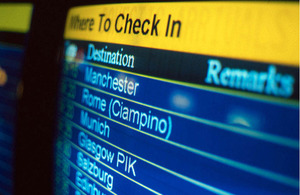Airports Commission begins dialogue on airport capacity
Seeking views on UK’s aviation capacity.

Departures board
The Airports Commission has today published 2 documents that will begin its dialogue with stakeholders, including the public, on the subject of aviation capacity.
The first of today’s publications is a guidance document which serves as an invitation for parties with an interest in the future of the UK’s aviation policy to submit their ideas for making best use of existing capacity and on adding new capacity in the longer term.
The document seeks views on the short, medium and long term options and provides parties making submissions with information on the commission’s timetable of work, as well as guidance on the factors that are of interest to the commission.
Alongside this, the commission has begun a separate process of public and stakeholder engagement to inform its assessment of the UK’s capacity needs by publishing today a discussion paper on demand forecasting. The paper seeks to examine the role of forecasting as a tool to help enable the commission in addressing the range of issues that will play a part in their assessment of the evidence on the nature, scale and timing of the UK’s future aviation capacity and connectivity needs.
The paper takes the Department for Transport’s approach to forecasting UK aviation demand as a starting point for the commission’s work and seeks views on how this approach might be enhanced or supplemented to ensure that it is as effective as possible in supporting their analysis.
Howard Davies, the Chair of the Airports Commission, said:
The publication of these documents marks an important milestone for us. Since the Airports Commission was announced last year, I have been impressed by the enthusiasm we have seen from the public and our stakeholders to engage with us. I have also been struck by how much has changed since the last government review of airport policy in 2003.
We welcome the debate that we have generated so far and we are determined to run an open and transparent process. By publishing the guidance document, we will enable everybody who wishes to make a contribution to do so as effectively as possible. I would encourage a wide range of organisations and individuals to offer their views. We cannot afford to have this debate dominated by a narrow spectrum of opinion.
The guidance document explains that we will take a broad view of proposals and an integrated approach. We will not consider airport capacity as an isolated transport issue, but will seek to assess a range of economic, environmental, social and technical factors.
Our demand forecasting paper makes it clear that we are not jumping to any conclusions on the nature, scale and timing of any need for additional capacity. If we are to draw such conclusions, they must be based on a firm understanding of likely future demand. This paper invites evidence on how we might approach some of the difficult issues and questions around forecasts.
Today’s publications will enable the commission to deliver the initial tasks that government has set for it by the end of 2013. These tasks include:
- making an assessment of the scale, nature and timing of the UK’s airport capacity needs
- producing recommendations on making the best use of existing capacity within the next 5 years
- identifying those proposals for the medium term and for providing new capacity in the long term which merit further exploration by the commission, in advance of its final report in mid-2015
Notes for editors
The Airports Commission was launched on 2 November 2012. Its terms of reference require that it should report no later than the end of 2013 on:
- its assessment of the evidence on the nature, scale and timing of the steps needed to maintain the UK’s global hub status
- its recommendation(s) for immediate actions to improve the use of existing runway capacity in the next 5 years – consistent with credible long term options
Its terms of reference also require that it should report no later than summer 2015 on:
- its assessment of the options for meeting the UK’s international connectivity needs, including their economic, social and environmental impact;
- its recommendation(s) for the optimum approach to meeting any needs
- its recommendation(s) for ensuring that the need is met as expeditiously as practicable within the required timescale
The documents published today set out the commission’s approach to the tasks required of it by the end of 2013. The guidance document also sets out the process and timetable that the commission will follow for the early consideration of long term options.
Further information about the Airports Commission.
For interview requests or other media enquiries relating to the work of the Airports Commission please call 0207 944 3108.